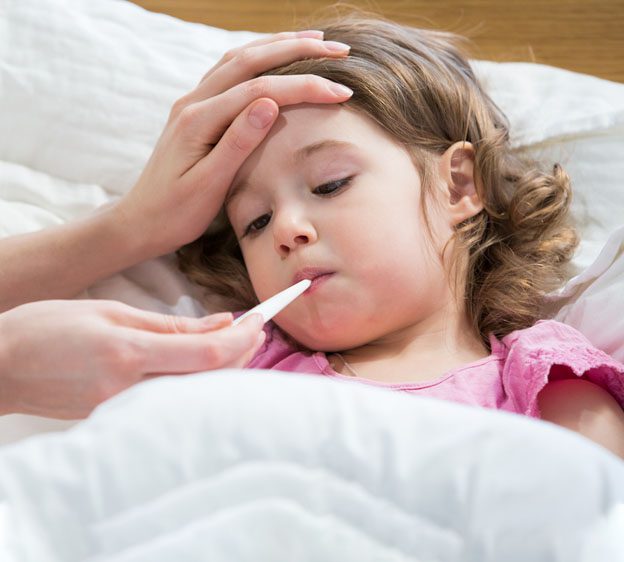Almost everyone’s childhood includes several common illnesses that are nearly unavoidable. Parents, especially those new to parenting, naturally become frightened and concerned when their child becomes ill. Illnesses are a part of growing up. However, parents with adequate knowledge about these illnesses will be less worried when they can recognise the symptoms and take the necessary actions. Today, we are exploring six common childhood illnesses and how to treat these conditions based on scientific evidence and best practices from trusted medical organisations like the American Academy of Paediatrics (AAP).
1. Sore Throat
Children often complain about having sore throats. In most cases, a sore throat is a symptom of viral infections such as the common cold. While there is no specific treatment in this case, children should get plenty of fluids, rest, and over-the-counter medications to combat the pain. However, when sore throats are caused by bacterial infections such as streptococcus (strep throat), children should see their paediatrician, who will prescribe an antibiotic like penicillin. When children begin taking these antibiotics, they should complete the prescribed dosage regardless of whether symptoms improve. Failing to do so may lead to complications like rheumatic.
2. Ear Pain
Children frequently complain about experiencing pain in their ears. This is often caused by ear infections (otitis media), swimmer’s ear, or sinus infections. It is crucial to seek medical assistance when children complain about feeling pain in both ears or the ear pain is accompanied by other symptoms such as fever or drainage. In cases when the ear pain is from a bacterial infection, an antibiotic like amoxicillin may be prescribed by their paediatrician. Pain relievers may also be prescribed to manage the discomfort. Treatments for ear pain caused by pressure from a cold often focus on managing symptoms until the cold clears up.

3. Urinary Tract Infection (UTI)
Children often complain about feeling pain during urination caused by urinary tract infections (UTIs). This health condition also increases their visits to the bathroom, can lead to bed-wetting, and causes abdominal discomfort. When children show signs of these symptoms, it is important to seek medical assistance quickly. If a child is diagnosed with a UTI, their paediatrician may prescribe antibiotics and specific medication depending on the bacteria identified. Untreated UTIs put children at risk of developing severe kidney infections.
4. Skin Infections
In some cases, skin infections in children are from minor irritations. Other times, children with skin infections are experiencing severe health conditions such as cellulitis or abscesses. If it is discovered that a bacterial infection is like RSA (methicillin-resistant Staphylococcus aureus), the paediatrician may prescribe a specific antibiotic. Skin infections at times require topical treatments or drainage of an abscess might be required. If your child has a history of resistant bacterial infections, this should be communicated to your paediatrician.

5. Bronchitis
Another common illness that children experience is bronchitis, which is often caused by a viral infection. Bronchitis is also known as inflammation of the larger airways in the lungs. Children with this health condition will display symptoms such as consistent coughs and discomfort in the chest. In many cases, antibiotics are not prescribed unless medical professionals suspect your child may have a secondary bacterial infection. Children with bronchitis are recommended to have plenty of fluids, rest, and also take over-the-counter medications to ease the symptoms.
6. Common Cold
As the name suggests, the common cold is a common condition in children. This illness is caused by viruses, and children may have it as often as 6-8 times per year. Children with the common cold will display symptoms such as runny nose, cough, and mild fever. Treatments such as saline nasal drops, steam, and fever reducers are effective in easing the discomfort, but there is no cure for the common cold. Additionally, antibiotics are never necessary for the common cold. However, if the flu-like symptoms persist longer than 10 days or worsen, parents must seek medical assistance.

